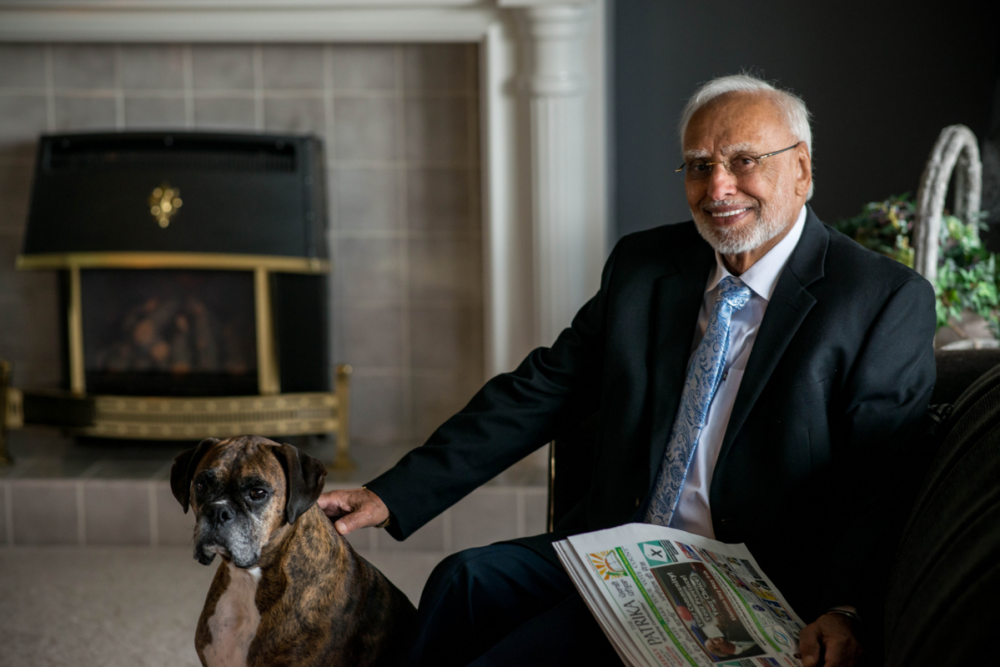Last summer, Andy received an honorary Doctor of Letters degree from UFV for his extensive community service.
There will be an installation ceremony at UFV on April 19, where he will take over the duties of chancellor from Dr. Gwen Point. His list of responsibilities as the ceremonial head of UFV will include attending board and senate meetings, and smiling broadly as he presides over the convocation ceremony.

How does it feel to be chosen as chancellor of UFV?
It’s going to be a learning process initially. But I’m excited, and first and foremost very humbled and honoured at the fact that they picked me to be the next chancellor.
I’ve been associated with the university for a long, long time now, but never in my dreams did I think that I would end up being a chancellor.
What will your goals be while you are the chancellor?
I’m going to be interacting more with the student population, of course. You see, my motive here has always been to bridge the gap between communities, right from day one.
My goals will basically be to open up the corridors for the benefit of the students that we have from other countries, to make them feel more at home. To respect each other’s religion, beliefs, and attire.
I will have to go and maybe sit down with all people, and find out for myself how exactly I can be of help, or how I can play a part in the day-to-day running of the university, and try to see if there is a role for me to play in the bigger picture.
Your newspaper’s mission statement was to bridge gaps in the Fraser Valley community. Do you feel it was successful?
Yes, to quite an extent I should say. In the sense that, when I first came into this community, back in 1974, things were different. Being of Indo-Canadian ancestry, I could sense a difference in the way both communities for that matter, the Indo-Canadian as well as the Caucasian community, were not that open with each other. You know, the Indo-Canadian community would cluster in their own little world here, and the Caucasian people would ask, “Who are these people? Why are they wearing turbans? Why are their lady-folks wearing clothes that look like pajamas?”
I felt that we needed a tool to try to get closer to each other. And what better way than a newspaper, where they could express their individual views, and read about the different communities?
How did that influence the way you viewed the community here?
I started off as the assistant manager of Agricultural Employment Services with the federal government. I had opportunities of visiting farms, and talking to farmers. Most of the farmers those days were Caucasian. For them to see a brown-skinned person speak English, and communicate with them so freely, was something that they held in awe, simply because most of the Indo-Canadians here could not speak English fluently.
Because I was bilingual, just about every one of the government offices would use my services as an interpreter. In a week, I would be out of my office at least three days, if not four: in immigration, at the police, at the community services, employment services, because of my ability to translate. I saw then that there was a dire need for us to have people educated to a certain extent, so that they could at least communicate. So, when I was approached, and asked if I could help him with that program, I was only too glad to be of assistance. We hired a tutor from Langley, and I went to the local temple and spoke to the people, and managed to get a class going where some people started to learn how to speak English.
So that kind of made me feel if I was going to start a newspaper, that I would like to start a bilingual newspaper. And 22 years later, we’re still around! That speaks for itself, I think.
What has been the biggest change in the Fraser Valley community since you came to Canada?
I mean, look at the schools, the universities. You’re going to the university. How often do you stop to take a second look at a south Asian person? Not often. They’re just a student, or a classmate. That’s it. That’s the difference: acceptance of people from other communities.
I am not saying that we don’t have racism. There is racism. Racism is not a very nice word. But racism has been practiced by everybody. You, me, we all do to a certain extent, consciously or subconsciously. Within your own house, within your own community. But it’s slowly and surely diminishing. You can go into a store at the mall, and not feel like you’re being looked at, or stared at, when you do your shopping, rubbing shoulders with people from different communities.
This interview has been edited for style and clarity.
Image: Darren McDonald/UFV


